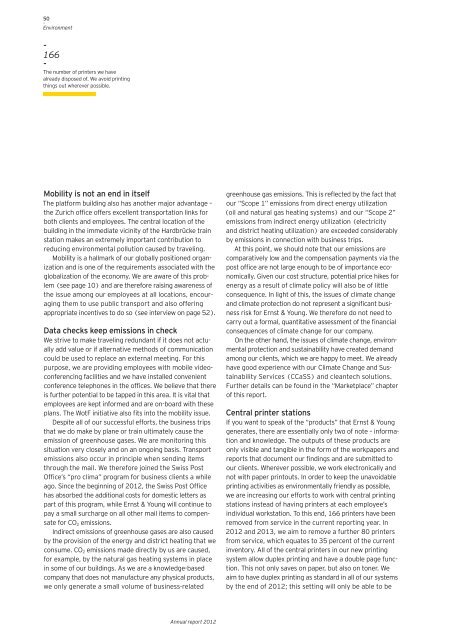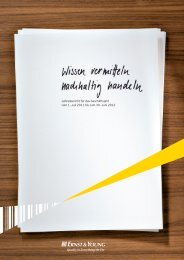Annual report for the fiscal year from 1 July 2011 to 30 June 2012
Annual report for the fiscal year from 1 July 2011 to ... - Ernst & Young
Annual report for the fiscal year from 1 July 2011 to ... - Ernst & Young
- No tags were found...
You also want an ePaper? Increase the reach of your titles
YUMPU automatically turns print PDFs into web optimized ePapers that Google loves.
50<br />
-<br />
Environment<br />
-<br />
166<br />
-<br />
The number of printers we have<br />
already disposed of. We avoid printing<br />
things out wherever possible.<br />
Mobility is not an end in itself<br />
The plat<strong>for</strong>m building also has ano<strong>the</strong>r major advantage –<br />
<strong>the</strong> Zurich office offers excellent transportation links <strong>for</strong><br />
both clients and employees. The central location of <strong>the</strong><br />
building in <strong>the</strong> immediate vicinity of <strong>the</strong> Hardbrücke train<br />
station makes an extremely important contribution <strong>to</strong><br />
reducing environmental pollution caused by traveling.<br />
Mobility is a hallmark of our globally positioned organization<br />
and is one of <strong>the</strong> requirements associated with <strong>the</strong><br />
globalization of <strong>the</strong> economy. We are aware of this problem<br />
(see page 10) and are <strong>the</strong>re<strong>for</strong>e raising awareness of<br />
<strong>the</strong> issue among our employees at all locations, encouraging<br />
<strong>the</strong>m <strong>to</strong> use public transport and also offering<br />
appropriate incentives <strong>to</strong> do so (see interview on page 52).<br />
Data checks keep emissions in check<br />
We strive <strong>to</strong> make traveling redundant if it does not actually<br />
add value or if alternative methods of communication<br />
could be used <strong>to</strong> replace an external meeting. For this<br />
purpose, we are providing employees with mobile videoconferencing<br />
facilities and we have installed convenient<br />
conference telephones in <strong>the</strong> offices. We believe that <strong>the</strong>re<br />
is fur<strong>the</strong>r potential <strong>to</strong> be tapped in this area. It is vital that<br />
employees are kept in<strong>for</strong>med and are on-board with <strong>the</strong>se<br />
plans. The WotF initiative also fits in<strong>to</strong> <strong>the</strong> mobility issue.<br />
Despite all of our successful ef<strong>for</strong>ts, <strong>the</strong> business trips<br />
that we do make by plane or train ultimately cause <strong>the</strong><br />
emission of greenhouse gases. We are moni<strong>to</strong>ring this<br />
situation very closely and on an ongoing basis. Transport<br />
emissions also occur in principle when sending items<br />
through <strong>the</strong> mail. We <strong>the</strong>re<strong>for</strong>e joined <strong>the</strong> Swiss Post<br />
Office’s “pro clima” program <strong>for</strong> business clients a while<br />
ago. Since <strong>the</strong> beginning of <strong>2012</strong>, <strong>the</strong> Swiss Post Office<br />
has absorbed <strong>the</strong> additional costs <strong>for</strong> domestic letters as<br />
part of this program, while Ernst & Young will continue <strong>to</strong><br />
pay a small surcharge on all o<strong>the</strong>r mail items <strong>to</strong> compensate<br />
<strong>for</strong> CO 2 emissions.<br />
Indirect emissions of greenhouse gases are also caused<br />
by <strong>the</strong> provision of <strong>the</strong> energy and district heating that we<br />
consume. CO 2 emissions made directly by us are caused,<br />
<strong>for</strong> example, by <strong>the</strong> natural gas heating systems in place<br />
in some of our buildings. As we are a knowledge-based<br />
company that does not manufacture any physical products,<br />
we only generate a small volume of business-related<br />
greenhouse gas emissions. This is reflected by <strong>the</strong> fact that<br />
our “Scope 1” emissions <strong>from</strong> direct energy utilization<br />
(oil and natural gas heating systems) and our “Scope 2”<br />
emissions <strong>from</strong> indirect energy utilization (electricity<br />
and district heating utilization) are exceeded considerably<br />
by emissions in connection with business trips.<br />
At this point, we should note that our emissions are<br />
comparatively low and <strong>the</strong> compensation payments via <strong>the</strong><br />
post office are not large enough <strong>to</strong> be of importance economically.<br />
Given our cost structure, potential price hikes <strong>for</strong><br />
energy as a result of climate policy will also be of little<br />
consequence. In light of this, <strong>the</strong> issues of climate change<br />
and climate protection do not represent a significant business<br />
risk <strong>for</strong> Ernst & Young. We <strong>the</strong>re<strong>for</strong>e do not need <strong>to</strong><br />
carry out a <strong>for</strong>mal, quantitative assessment of <strong>the</strong> financial<br />
consequences of climate change <strong>for</strong> our company.<br />
On <strong>the</strong> o<strong>the</strong>r hand, <strong>the</strong> issues of climate change, environmental<br />
protection and sustainability have created demand<br />
among our clients, which we are happy <strong>to</strong> meet. We already<br />
have good experience with our Climate Change and Sustainability<br />
Services (CCaSS) and cleantech solutions.<br />
Fur<strong>the</strong>r details can be found in <strong>the</strong> “Marketplace” chapter<br />
of this <strong>report</strong>.<br />
Central printer stations<br />
If you want <strong>to</strong> speak of <strong>the</strong> “products” that Ernst & Young<br />
generates, <strong>the</strong>re are essentially only two of note – in<strong>for</strong>mation<br />
and knowledge. The outputs of <strong>the</strong>se products are<br />
only visible and tangible in <strong>the</strong> <strong>for</strong>m of <strong>the</strong> workpapers and<br />
<strong>report</strong>s that document our findings and are submitted <strong>to</strong><br />
our clients. Wherever possible, we work electronically and<br />
not with paper prin<strong>to</strong>uts. In order <strong>to</strong> keep <strong>the</strong> unavoidable<br />
printing activities as environmentally friendly as possible,<br />
we are increasing our ef<strong>for</strong>ts <strong>to</strong> work with central printing<br />
stations instead of having printers at each employee’s<br />
individual workstation. To this end, 166 printers have been<br />
removed <strong>from</strong> service in <strong>the</strong> current <strong>report</strong>ing <strong>year</strong>. In<br />
<strong>2012</strong> and 2013, we aim <strong>to</strong> remove a fur<strong>the</strong>r 80 printers<br />
<strong>from</strong> service, which equates <strong>to</strong> 35 percent of <strong>the</strong> current<br />
inven<strong>to</strong>ry. All of <strong>the</strong> central printers in our new printing<br />
system allow duplex printing and have a double page function.<br />
This not only saves on paper, but also on <strong>to</strong>ner. We<br />
aim <strong>to</strong> have duplex printing as standard in all of our systems<br />
by <strong>the</strong> end of <strong>2012</strong>; this setting will only be able <strong>to</strong> be<br />
<strong>Annual</strong> <strong>report</strong> <strong>2012</strong>



